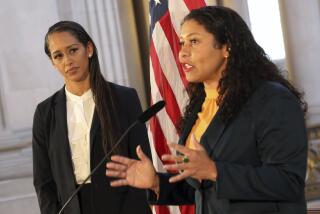Iran to join U.S. in Afghanistan conferences
- Share via
BEIRUT AND TEHRAN — It was an eye-popping bust: 4.5 tons of opium, hashish and other drugs seized from nine alleged smugglers last weekend in two cities near the Iranian capital.
Two days later, police in eastern Iran, near Afghanistan, stopped a pickup packed with a quarter of a ton of opium in compartments under the floorboards, according to local news reports. And cops in the border town of Zabol recently seized another quarter-ton of Afghan opium.
Whatever Iranian officials might feel about U.S. troubles in Afghanistan and Pakistan, there is a rising alarm in Tehran over the torrent of drug dealing, human trafficking and violence connected to the mayhem in the region that is washing across Iran’s eastern border.
The Islamic Republic announced Thursday that it will join the United States in dispatching official delegations to two international conferences on Afghanistan. The Obama administration has welcomed Tehran’s intended participation at one in the Netherlands.
U.S. and Iranian interests overlap in Afghanistan, perhaps more than on any other issue. The Obama administration, which has committed itself to diplomatic outreach to Tehran, has favored a greater Iranian role in efforts to stabilize Afghanistan as a way of building trust between the long-estranged U.S. and Iran and resolving disputes, especially over Iran’s nuclear program.
But Iranians say they’re wary of getting burned, as they say they were after quietly cooperating with the Bush administration in 2001 and ’02 when the U.S. overthrew the Taliban government in Afghanistan and brought President Hamid Karzai to power. That brief flowering of diplomatic contacts ended with former President George W. Bush labeling Iran as part of an “axis of evil” along with North Korea and Saddam Hussein’s regime in Iraq.
Since then Iran has ramped up its nuclear program, which it says is for civilian purposes, in defiance of U.S. demands to halt it. It has also increased its support for Arab militant groups fighting Israel, a key American ally. But increasingly, Tehran finds its interests coinciding with the U.S. in Afghanistan and Pakistan, where the resurgence of the Taliban and the warfare have created a vortex of chaos drawing in Iran.
“Iran and the United States have a fundamental point of interest in the region vis-a-vis Afghanistan,” said Sadegh Zibakalam, professor of political science at Tehran University. “Both want to see a moderate, democratic, stable Afghanistan because if there is chaos in Afghanistan, it means opium to Iran and Afghan refugees in Iran.”
Russian officials said Thursday that they would be willing to help break the ice between Iranian and American officials at the Shanghai Cooperation Organization conference on Afghanistan, which opens today in Moscow.
Iran is sending Deputy Foreign Minister Mahdi Akhundzadeh, and Deputy Assistant Secretary of State Patrick Moon will represent the U.S.
“We assume that the launch of such a negotiating process would help reduce tensions in the situation surrounding Iran and the region on the whole,” Russian Foreign Ministry spokesman Andrei Nesterenko told reporters.
Iran is also attending the conference on Afghanistan at The Hague next week, after staying away from such meetings. But some Iranian analysts cautioned not to read too much into Tehran’s decision; their concerns were underscored by Iranian Foreign Ministry spokesman Hasan Qashqavi, who told The Times that the “level of participation is yet to be determined” for the Hague conference. Iran might dispatch a low-level envoy, suggesting an ambivalent response to U.S. gestures.
Iranians are wary of giving Americans a possible public-relations victory without getting anything in return.
“Whenever they need us, they use our influence; but as they reach their objectives, they treat us as a major threat in the region,” said a recent editorial in the conservative Siasat Rooz newspaper.
But even some Iranian hard-liners have begun to welcome the idea of cooperating with the U.S. and the North Atlantic Treaty Organization in helping secure Afghanistan, calling it a victory for Iranian steadfastness.
There are practical matters as well. Iranian officials say the drug war has cost their nation more than $600 million in the last two years. About 3,700 Iranian security officials were killed and 11,000 maimed in more than 12,000 clashes between traffickers and police officers between 1989 and 2003, according to Iranian statistics cited in a United Nations report.
All indications are that the problem is worsening as Afghanistan descends further into lawlessness. From 2006 to ‘07, drug seizures, as measured by weight, jumped 35% for heroin, 37% for opium and 52% for hashish, according to figures on the website of Iran’s Drug Control Headquarters.
Total drug seizures rose from 155 tons in 2001 to 618 tons in 2007, almost all of it opium, heroin and hashish from Afghanistan; addiction is rapidly becoming Iran’s top public health problem.
Tehran has been digging canals, raising earthen berms and laying out barbed wire. Still, the drugs flow in, sometimes strapped to camels crossing the desert, sometimes protected by well-armed gangsters equipped with satellite technology and automatic weapons.
“The more the Islamic Republic of Iran interacts in the regional and international arenas, the better,” Hamid Reza Haji-Babai, a member of the parliamentary leadership, said Thursday. Easing tension between Iran and the U.S. “can be achieved within these interactions and participation in conferences.”
Perceptions and politesse will play a significant role in determining the level of Iran’s participation at the summit. Tehran canceled on French President Nicolas Sarkozy’s Afghanistan conference in December after he said he would never shake hands with Iranian President Mahmoud Ahmadinejad, a comment Iran decried as insulting.
Not one Iranian official, not even Tehran’s ambassador to France, attended that conference.
--
Mostaghim is a special correspondent.
More to Read
Sign up for Essential California
The most important California stories and recommendations in your inbox every morning.
You may occasionally receive promotional content from the Los Angeles Times.













